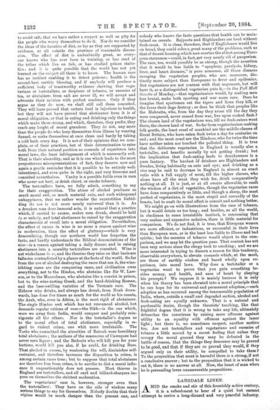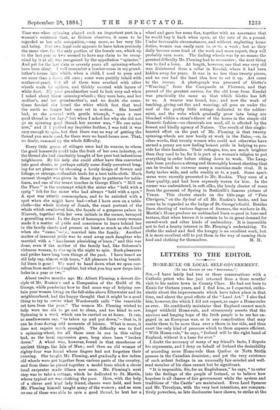LANGD ALE LINEN.
AMID the smoke and stir of this feverishly active century, it is a refreshment to hear of a quiet but earnest attempt to revive a long-disused and very peaceful industry.
'rime was when spinning played. such an important part in a woman's existence that, as Grimm observes, it came to be regarded as her sole occupation,—nay more, as her very life and. being. Our own legal code appears to have taken precisely the same view, for the only portion of the female sex, which up to the last year or two seemed to have any claim to be recog- nised by it at all, was recognised by the appellation "spinster." And. yet for the last sixty or seventy years all spinning-wheels have been silent. I well remember a lumber-room in my grand- father's house, into which, when a child, I used to peep and see more than a dozen old ones ; some were prettily inlaid with mother-of-pearl, bat all of them were overlaid with other wheels made by spiders, and thickly covered with layers of white dust. My poor grandmother used to look very sad when / asked about these spinning-wheels ; they were hers, and her mother's, and, her grandmother's, and no doubt she some- times fancied she heard the whirr which feet that trod the earth no longer had once set in motion. She herself had, as she averred. with gentle triumph, "spun a rare good thread in her day ;" but when I asked her why she did not go on spinning good thread, her answer was, "No one spins now," and if I pushed my inquiries further, I was told it was easy enough to spin, but that there was no way of getting the thread you made used, for there were no hand-looms now. That, no doubt, summed up the whole difficulty.
Every little group of villages once had its weaver, to whom the good housewife could take the fruit of her own industry, or the thread she had charitably bought of her poor but industrious neighbours. By his help she could either have this converted into good sheets, or perhaps satisfy some dimly-perceived long- ing for art pleasure by choosing a lovely design of flowers and foliage, or strange, outlandish birds for a best table-cloth. Much earnest thought was given in those days to patterns for table- linen, and one of the truest touches in George Eliot's "Mill on the Floss" is the contempt which the sister who "held with a sprig" felt for the sister who had always "held with a spot." A spot was utterly commonplace, and to be satisfied with a spot when she might have had—what I have seen on a table- cloth—the whole history of Jonah, the exact portrait of the whale which swallowed him, the façade of a gorgeous palace in Nineveh, together with her own initials in the corner, betrayed a grovelling mind. In the days of homespun linen every woman made it a matter of pride and conscience to leave behind her in the family chests and presses at least as much as she found when she "came,"—Le., married. into the family. Another matter of innocent pride was to send away each daughter who married with a "handsome plenishing of linen ;" and this was done, even if the mother of the family had, like Solomon's virtuous woman, to rise up in the night to spin. Such pleasures and prides have long been things of the past. I have heard an old lady say, almost with tears, "All pleasure in having beauti- ful linen is gone ! We used to hand down what we spun our- selves from mother to daughter, but what you buy now drops into holes in a year or two."
About twelve months ago Mr. Albert Fleming, a devout dis- ciple of Mr. Ruskin' s and a Companion of the Guild of St. George, while pondering how to find. some way of helping cer- tain poor women living on the fell-sides above Elterwater and its neighbourhood, had the happy thought that it might be a good thing to try to revive what Wordsworth calls "the venerable art torn from the poor." The women Mr. Fleming wished to help were too old to go out to clean, and too blind to sew. Spinning is a work which can be carried on at home. It can, as needlewomen say, "be taken up and put down,"— that is, it can be done during odd moments of leisure. What is more, it does not require much eyesight. The difficulty was to find a spinning-wheel, for all those once in use in this valley had, as the local expression goes, long since been "broken down." A wheel was, however, found in that storehouse of ancient things, the Isle of Man ; and then an old woman of eighty-four was found. whose fingers had not forgotten their cunning. She taught Mr. Fleming, and gradually a few infirm old wheels were got together from various parts of the country, and from these he pieced together a model from which a clever local carpenter made fifteen new ones. Mr. Fleming's next step was to take a cottage, which he dedicated to St. Martin, whose typical act was clothing the poor. Here, with the help of a clever and kind lady friend, classes were held, and here Mr. Fleming himself taught many of the women ; and as soon as one of these was able to spin a good thread, he lent her a wheel and gave her some flax, together with an assurance that he would buy it back when spun, at the rate of 2s. a pound. Under favourable circumstances, and without neglecting home duties, women can easily earn 5s. or Os. a week ; but as they daily become more fond of the work aud more expert, they will probably earn more. The finding wheels was by no means the greatest difficulty Mr. Fleming had to encounter ; the next thing was to find a loom. At length, however, one that was very old was disinterred from a cellar in Kendal, where it had been hidden away for years. It was in no less than twenty pieces, and no one had the least idea how to set it up. Art came to the rescue. A photograph was procured of Giotto's "Weaving," from the Campanile. at Florence, and that proved of the greatest service, for the old loom from Kendal was practically the same as that which Giotto has left to us. A weaver was found, too ; and now the work of teaching, giving out flax and weaving, all goes on under the roof of the pretty little cottage dedicated to the soldier- saint, and the webs which gradually grow into being are bleached within a stone's-throw of the house in the simple old Homeric fashion—no chemicals are used, all is effected by the honest and kindly agency of Nature. The result of this single- hearted effort on the part of Mr. Fleming is that twenty spinning-wheels are now busily at work in the Dales,—or, in other words, that twenty women who could not otherwise have earned a penny are now feeling honest pride in helping to pro- vide for their families. Their cottages, too, are much brighter than they used to be, for it is part of a woman's religion to put everything in order before sitting down to work. The Lang- dale loom produces a strong and thoroughly honest sheeting that can be trusted to outwear many a machine-made rival. It is forty inches wide, and sells readily at 4s. a yard. Some speci- mens were recently presented to Mr. Raskin. They were of a finer quality, and had been expressly woven for him. In the corner was embroidered, in soft silks, the lovely cluster of roses from the garment of Spring in Botticelli's famous picture of Venus. This cluster stands on the title-page of "Fors Clavigera," on the fly-leaf of all Mr. Ruskin's books, and has come to be regarded as the badge of St. George's Guild. Besides linen sheeting of various degrees of fineness, the workers in St. Martin's Home produce an unbleached linen so good in tone and texture, that when known it is certain to be in great demand for crewel-work and other kinds of embroidery. It is impossible not to feel a hearty interest in Mr. Fleming's undertaking. To clothe the naked and feed the hungry is an excellent work, but it is more excellent still to put them in the way of earning their



































 Previous page
Previous page